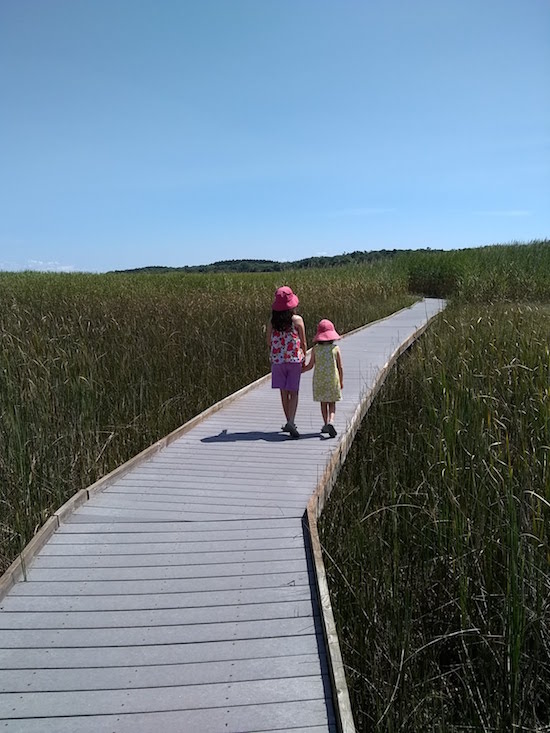September 4, 2018
New Leaf
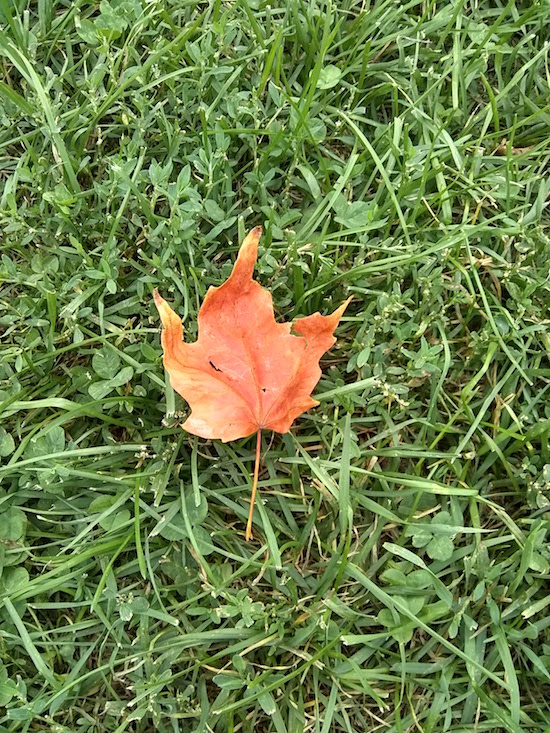
But as much as I love summer, I’m not sorry to see September at all. I’m happy to get my workdays back, for life to rediscover balance. My room is tidy for the first time in months, and yesterday I found a little bookshelf on the curb with which to organize the avalanche on my bedside table. I have no doubt that this little shelf will change my life, which is the kind of thought I often have in Septembers. This will be year I get it right, and not least of all because of my cool slouchy Cotton Ginny top. Obviously, of course, those were the September thoughts of a few decades ago. But still, the sentiment is the same.
This September is all about new beginnings, and also (I hope!) endings too, as I finally finish the first draft of my new novel, still untitled. It’s about taking the lessons of summer’s freedom with me into the new school year and making the most of the time I have to work while my children are at school. It’s also about serious reading as the evening belong to books again, and it is my best intention (although it always is) not to fritter it away on internet excess. I want to use my phone less while I am at home, keeping it in a fixed place in the house instead of always within arm’s reach. And I want to be more deliberate about the way I use social media too, visiting these sites just once or twice a day, when I have something to post even, and not just because I’m bored and require a distraction. I already don’t have Twitter and Facebook on my phone, so it’s not the world’s hugest problem, but I want to become more active as a user of these sites, instead of just passively scrolling along. And no phones at dinner. I don’t care what your excuse is. Or that the excuse is always mine.
September 3, 2018
Summerlong
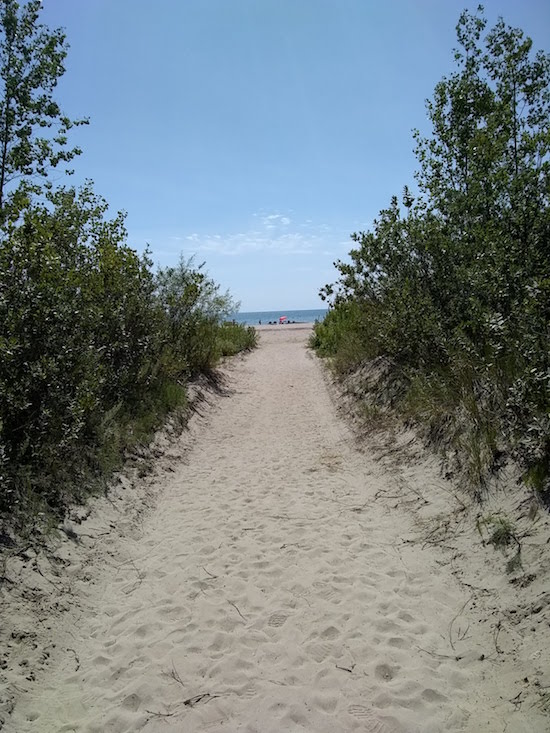
I love summer. I love it. I love popsicles and pools and eating dinner outside in the shade of umbrellas. I love the buzz of cicadas, the flash of butterflies, and the birds that start chirping before the sun comes up. Even if they wake me up before the sun comes up, and I even love the heat. Or maybe I mean I don’t mind hating the heat, because if ever there was a thing to suffer through. Treatable with long saunters through the frozen food section at the grocery store, whole weeks without turning the oven on, and by jumping into pools whose hours have been extended late into the night.
We have had a beautiful summer. (I think I write this every year, but it feels incredible and novel every single time. A triumph.) We had a wonderful week at a cottage by a lake with friends who make our life so rich, and our kids were kept entertained and stimulated at daycamps they both enjoyed so much. We went camping twice this year, which is a very big deal for us, and there were marshmallows roasted and wildflowers spotted and stoned skipped twice in the water. We spent a week in Peterborough with my parents, and there were turtles and crafts and voyageur canoes. We went on adventures around our city and went to events at the library, dipped our feet in wading pools, hung upside down on the climbing bars, and raced through the freezing relief of fountains at the splash-pad.
There was ice cream, and popsicles, and walks home from the grocery store where we had to run so the contents wouldn’t melt. My basil plant became enormous. I read extraordinary books. We went to shows at Fringe TO and saw Midsummer Night’s Dream in High Park, which delighted everybody. We went on car rides with the windows wide, and listened to Carly Rae Jepsen, Taylor Swift’s “Delicate” and “Strangers” by Sigrid. We went to the ROM, the AGO and the Textile Museum. We went swimming in lakes, pools, a quarry and a river. We had to shake sand out of everything numerous times. There was a rainbow at least once, and everybody got better at swimming. The Christie Pits waterslide was aways an adventure. We saw a meteor shower and fireflies.
And it was precious, all of it. Because summer is abundance, a wave of too-muchness, life growing up between the cracks in the sidewalk, and you can’t hold any of it, not even for a moment. Summer is a force and it just goes and goes and goes, and the best thing you can do is just be swept along by it, and be able to say in the end: we are so lucky and that was good.
September 1, 2018
T is for Tugboat
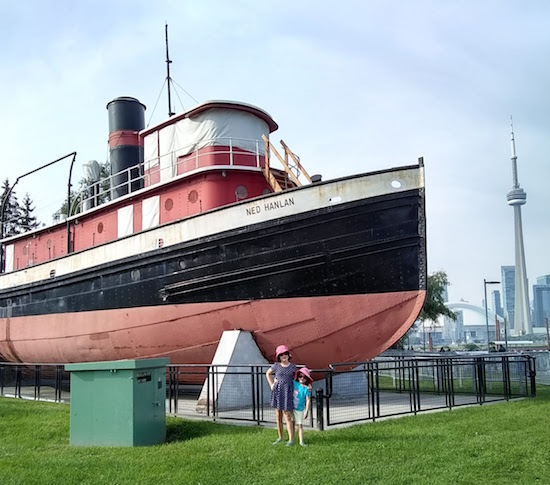
When Harriet was nearly two, I was inspired to begin recreating images from Allan Moak’s iconic Toronto alphabet book A Big City ABC, and thus Harriet’s Big City Alphabet was born! Born—but then left incomplete for five whole years. The most recent post was B is for Baseball in 2013. But then today we found ourselves at Hanlan’s Point, and finally we could get the shot for T is for Tugboat! Harriet is a thousand feet taller and she’s got a little sister now who’s no slouch either. And maybe now we should look into finishing the alphabet, because obviously it’s never too late.
August 30, 2018
Women Talking, by Miriam Toews

“No Ernie, says Agata, there’s no plot, we’re only women talking.”
Women Talking, the latest novel by Miriam Toews, is not an easy read. Not easy because of the places it takes its readers to—the women talking in Women Talking are women from a Mennonite community in Bolivia, women whose husbands/brothers/sons have been accused to raping the women while they were sleeping, incidents based on real events, so-called “ghost rapes,” and it’s how women respond to and try to move on from this trauma that raised important questions for Toews as she considered writing this book, more than the fact of the violence itself. Because violence is ubiquitous. As Toews said in conversation with Rachel Giese when I went to see her last week, she can imagine what a rape is like. But what happens after—how do you imagine a way through that? And then she said something else, an echo of line in the novel which I read a few days later: “We are all victims, says Mariche./ True, Salome says, but our responses are varied and one is not more or less appropriate than the other.”
This line reminded me of Jia Tolentino’s article in The New Yorker on The Women’s March in 2017, and the way that so many were quick to jump on organizational conflicts and disagreements as a way to dismiss the movement altogether. Scoffing is often what happens when we hear about women talking—it’s either idle gossip, or else a petty scrap. A catfight. Women talking—it’s on the background, unless the voices are shrill. Or when they’re allowed to be a chorus. But in her novel, Toews dares to make women talking everything. The “there’s no plot” line is a funny meta-joke. But this is difficult too, on a practical level. To follow along with the conversations, to discern who these people speaking are as we’re just beginning to know them as characters. And Toews complicates the work further by refusing to make any of her characters just one thing—these are women who are difficult, who argue with each other out of spite, who contradict themselves and turn their own arguments inside-out, because this is what thinking is. For the first half of the novel, I confess that I was a little bit lost, finding the narrative hard to follow, and not remotely sure how the whole thing would come together.
But then mid-way through, something happened—it was like the walls started closing in on the threat to these women in the hayloft talking, these women who were daring to defy their husbands, brothers, sons. To explore the three options available to them: do nothing, stay and fight, or leave, but then the men who’ve gone to the city to post bail for the others could return at any time. And suddenly this novel without a plot takes on the most furious momentum and becomes unputdownable. In this novel in which nothing’s happened yet, something is going to have to give—but what?
The women talking in the novel are people who’ve never learned to read or write, who cannot read a map, and know nothing about the world beyond the boundaries of their communities. (I read this book right after Claudia Dey’s Heartbreaker, which is such a completely different novel in spirit, but there’s a kinship between them.) As the women in the novel are illiterate, writing down the minutes of their meeting is tasked to August Epp, an estranged member of the community who has returned after years away to serve as a school teacher (which is basically to be a failed farmer, and shameful occupation for a man). And August’s own complicated story, and his love for Ona, one of the women whose words he’s recording, becomes a foundation for the novel, as it would be, although just why or how does not become apparent until the conclusion, which only adds to its devastating and beautiful ambiguity.
August 28, 2018
On Diversity and Excellence

Earlier this year, some windbag on Twitter had a hissy fit and started posting about how—and I quote—”Political correctness is killing fiction,” which I found really annoying mostly because of a conspicuous lack of evidence that this windbag has read a single work of fiction in the past five years. And also because what he really meant by “political correctness” was actually a) that white writers are facing a new and demanding kind of criticism in their work when they write about other cultures and b) a new spotlight on and celebration of works by writers who are telling stories many of us haven’t heard before. These comments were also really frustrating because this person who never reads fiction was proclaiming the death of fiction when my own personal experience is that fiction has never been so rich. I was reading The Lost Girls of Camp Forevermore, by Kim Fu, when this stupid tweet was posted, which only underlined its absurdity. I loved that book. And all this came to mind again last week when I had the great fortune of reading Claudia Dey’s Heartbreaker followed by Miriam Toews’ Women Talking. Has fiction ever been more alive? But I guess you actually have to read a book to know that.
Not unrelated, the other day Conservative MP Lisa Raitt was quoted as saying, somewhat incoherently, that she wouldn’t want a place in the Liberal Party as a woman because if she succeeded there she’d never really know if she’d made it on her own merits or if it was because a certain number of women had been mandated. As though the two categories (quotas and qualified candidates) were mutually exclusive, as though there might not be a healthy pool of qualified women candidates to choose from—which, admittedly, for the Conservatives, is a possibility, as their candidates in the 2015 federal election were 20% women, vs. 42% for the NDP. The Liberal candidates were only 31% women, which was not entirely impressive, and yet. When Prime Minister Justin Trudeau unveiled his gender balanced cabinet (because it was 2015, if you recall) he somehow still managed to appoint a Health Minister who was a doctor, an Attorney General who was an Indigenous lawyer, an International Trade Minister who’d been a Rhodes Scholar and a renowned expert on global finance, an Environment Minister with a master’s degree in International Relations from the London School of Economics, a Minister of Sport and Persons With Disabilities who has been a lawyer and a Paralympic athlete, and a Minister of Science who has been a scientist since receiving her PhD in 1992. And while we’ve all spent a lot of time in the years since then thinking about the fact of gender parity, too little focus has been put on the fact that these women are among the most qualified cabinet members I’ve ever seen in my lifetime.
Lisa Raitt too comes to the political arena with a lot of expertise and experience—and something to keep in mind when thinking about gender parity is how much more excellent a woman has to be than her male peers in order to reach the same levels of success. Which reminds me of this very funny satirical piece written shortly after Trudeau’s cabinet was appointed: “50% female cabinet appointments lead to 5000% increase in guys who suddenly care about merit in cabinet:” “I mean, Jason Kenney alone was Minister of Immigration before being shuffled to Multiculturalism, then Social Development, and then finally National Defense—clearly because he was the most qualified person in the entire country on all those four completely unrelated files.” Clearly.
They are not exclusive, diversity (whether it be gender balance and ideally beyond) and excellence, is what I mean. Is what Trudeau’s cabinet has proven, although so many seem to miss the point, forest for trees etc. because for ideological reasons a focus on diversity makes many peoples’ heads explode. But I will go so far as to say that excellence is actually a natural product of diversity, which is why diversity is so necessary and important right now as our society confronts a variety of challenges. And if you’re looking for excellence, diversity is naturally what happens. And if diversity doesn’t happen, then you have failed in making something excellent.
 Which was only confirmed for me in my experience as a juror for The Journey Prize this year—as jurors, we read one hundred stories with no identifying details of their authors. Which is a fraught exercise at this political moment, particularly if you are someone who, like me, thinks that the author is not dead and personal identities matter. Fraught, because I didn’t want to fail at excellence. Of course, the stories themselves are what really matters, but personal identities matter too because it’s always obvious to me when I’m reading a book about a fourteen-year-old girl written by a man who has no idea what that feels like and who has failed in the imaginative leap of writing that experience in a way that is convincing. Personal identities and experience only fuel a writer’s work, I think, and make that work so much richer. So much more excellent. But all this was still just faith for me while I was reading stories for the Journey Prize, and my fellow jurors and I were having some meaningful conversations about what excellence meant. Concluding, basically, that we wanted the stories we selected to definitively not be the Jason Kenneys of literature, in a nutshell. Serving as Minister of Immigration before being shuffled to Multiculturalism, then Social Development, and then finally National Defense. We wanted specificity. Details, in addition to sparkling prose. We wanted to be unsettled in ways that are entirely new, transported to places that were familiar and yet unknown to us. No mediocrity would sneak its way into this book. We wanted unfailingly interesting.
Which was only confirmed for me in my experience as a juror for The Journey Prize this year—as jurors, we read one hundred stories with no identifying details of their authors. Which is a fraught exercise at this political moment, particularly if you are someone who, like me, thinks that the author is not dead and personal identities matter. Fraught, because I didn’t want to fail at excellence. Of course, the stories themselves are what really matters, but personal identities matter too because it’s always obvious to me when I’m reading a book about a fourteen-year-old girl written by a man who has no idea what that feels like and who has failed in the imaginative leap of writing that experience in a way that is convincing. Personal identities and experience only fuel a writer’s work, I think, and make that work so much richer. So much more excellent. But all this was still just faith for me while I was reading stories for the Journey Prize, and my fellow jurors and I were having some meaningful conversations about what excellence meant. Concluding, basically, that we wanted the stories we selected to definitively not be the Jason Kenneys of literature, in a nutshell. Serving as Minister of Immigration before being shuffled to Multiculturalism, then Social Development, and then finally National Defense. We wanted specificity. Details, in addition to sparkling prose. We wanted to be unsettled in ways that are entirely new, transported to places that were familiar and yet unknown to us. No mediocrity would sneak its way into this book. We wanted unfailingly interesting.
And guess what: diversity happened. My faith confirmed that diversity and excellence are inextricably linked. When we focussed that hard on excellence, we ended up with a list of writers from a range of ages and backgrounds. Some of them names we’d never heard of before, others that were familiar. A list of writers whose faces look more like the world does than your average Conservative cabinet, which is a wonderful thing to discover, that something has gone very right in the process. Because diversity and and excellence go hand and hand, as the Journey Prize Stories 30 will demonstrate when it comes out next month. In addition to serving as a reminder that fiction is absolutely thriving.
August 16, 2018
August
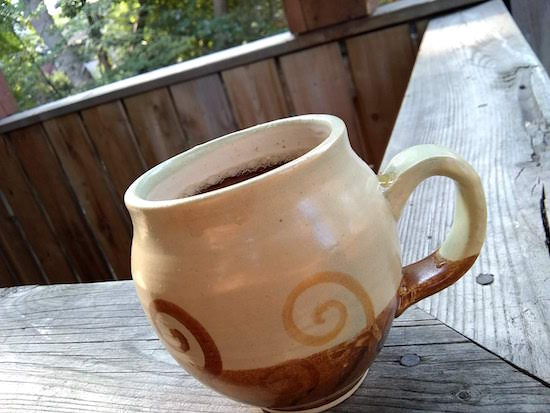
It’s been a wonderful summer, but now it’s mid-August, and I’m starting to lose the plot. And maybe I mean that even a bit literally—I’m 47,000 words into the first draft of a novel and I’ve just kind of reached the climax and don’t actually know what’s going to happen next, which is a terrifying point to be at. It’s like staring over the edge of a cliff, and thinking, But what if this thing doesn’t fly? Which is kind of the way I feel in general, 3/4 of the way through a summer that has been sunshine and swimming and holidays, so many good things, which is nothing to ever take for granted. We make these plans, and then sometimes fate intervenes—but this summer so many of our good days have rolled out like carpets. It’s been fabulous, but I’m also find the lack of structure a little overwhelming. And yes, I’ve succeeded at writing 47,000 words of a new novel and also the 49th Shelf Fall Preview (which IS NO SMALL TASK) but everything else has fallen by the wayside. I’m been meaning to write thank you notes, and letters, and clean my house, and organize the giant pile of stuff on the kitchen table, and read library books with my children, and do little things to get ahead once the craziness begins come September, and it all just seems out of reach, and not because I don’t have time for it all, but because I’m feeling sluggish. It’s hot outside and I’m always sweating, and I could be on the ball to just go go go, but I’m not. I am also spending disproportionate amounts of time being befuddled by the stupidity of people on Twitter and also the abject cruelty of conservative politicians, and it’s so disheartening, and takes up energy too. And today I thought, “What if I’m never productive again?” I pride myself on being a person who gets things done, but when I’ve got less to do, it all falls apart. So I’m looking forward to getting back on track in the next few weeks—either that, or having my entire being atrophy.
August 15, 2018
Swell: A Waterbiography, by Jenny Landreth
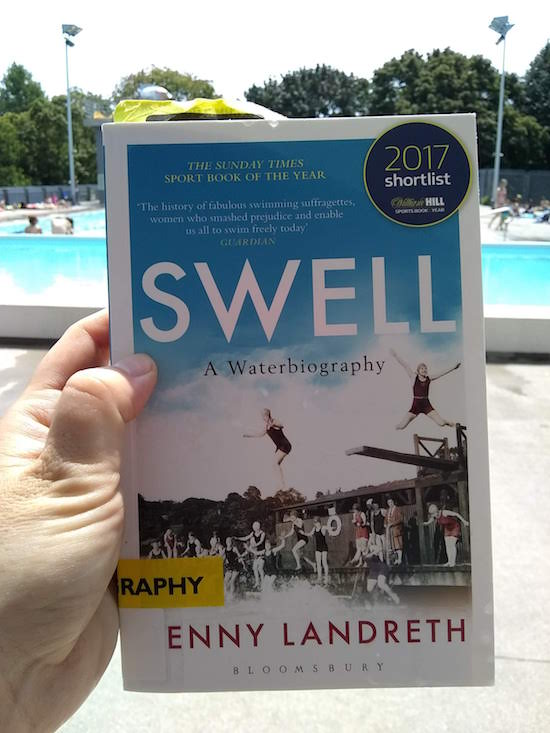
The gendered nature of swimming is something I think about all the time, although most often when I am sharing a lane with a man who has found taking up ample space by merely having longer limbs than I do unacceptable, and therefore has decided to enhance his lengths with flippers on his feet and paddles on his hands, increasing his chances of making violent contact with my body as he passes me. The women in the pool I swim at don’t do this, and neither do they, as one swimmer in Jenny Landreth’s spectacular book Swell: A Waterbiography does, butterfly up and down narrow lanes driving all other swimmers into the gutter. In her recent book, Boys, Rachel Giese writes about the way that boys are taught to be entitled to public space, as they dominate the basketball courts on the playground, and because I spend most of my time hiding in libraries, I don’t encounter this very much, but it’s in the pool I do. And it all makes me think of the line on the very first page of Swell, which was where I fell in love with this book: “how swimming can be a barometer for women’s equality.” We’ve all come a long way, but still.
Swell is my favourite book I’ve read this summer, a summer that has been all about swimming, in pools and lakes, as both my children are both at pivotal stages in the development of their inner fishes, and we can worry slightly less about the little one drowning. I’ve gone swimming by myself four mornings a week along with the men with the hand paddles and the flippers, and then later in the day we’ve all gone to the public pool and I’ve sat in the shallows and tried not to think about pee as my daughters delighted in turning somersaults over and over again. So yes, Swell was just absolutely perfect.
It’s a book I’d situate as what might happen if Sue Townsend of Adrian Mole fame got together with Elizabeth Renzetti’s Shewed and they decided to have a literary baby that was also a social history of women swimming in England. The result is absolutely delightful, empowering, and so terrible funny in its asides that I kept reading them aloud to the people around me who became very confused about what this book was about exactly. But that’s because it’s about everything, about the history of suffrage, and bathing suits, and public pools, and mixed beaches, and how women used to drown all the time because they weren’t taught to swim, and about how when they decided they did want to learn how to swim, no one could teach them because all the instructors were men and men and women couldn’t possible swim together. It’s about pools where women were accorded very little time for swimming, and it was usually during the day when no one could make it anyway. It’s about women who defied convention (and their mothers!) to become swimming superstars, pioneering the front crawl in England, swimming the English channel, being the first women swimmers in the Olympic games.
Landreth writes, “‘In front of every great woman is another great woman… Women whose lies will change. Some who will take this story, make it their story and push it on to its next pages.”
And of course, Landreth’s own story is part of this book, her “waterbiography”—and she admits to being proud to have coined the term. She grew up in the Midlands, which is kind of a swimming desert—when I lived there I was once so desperate for a swim that I dove in the duck pond on the Nottingham University Jubilee Campus—and was an unlikely candidate to become an avid swimmer for a host of reasons. She writes about learning to swim as a child, about travelling to Greece in her 20s and trying proper swimming for the first time, about lacklustre swimming as part of the 1980s’ fitness craze, about what an awful and unfulfilling thing it is to go swimming with small children—and then about finding her identity as a swimmer once her children were older, and what a thing it is that women can do this at any age. About how empowering it was to learn to call herself a swimmer.
There is indeed something womanly about swimming, in spite of the Michael Phelpses and the men with paddles on their hands. I mean, have you ever heard of a male mermaid? No. And I can’t for the life of me think of a single man who’s swam across Lake Ontario, but I know about Marilyn Bell and Vicki Keith, and Annaleise Carr, a swimming hero for every generation. I have dreams of one day swimming in the Ladies Pond at Hampstead Heath. I used to buy terrifically fancy swimsuits, but lately I’ve become enamoured of my sporty suits, the ones I wear while swimming in the pool in the mornings. Where my favourite swimmer is this woman I’ve never spoken to, but she’s my hero—grey bathing cap (I wouldn’t know her without it) and same bathing suit as mine, a bit stocky, older than I am. And in the pool every morning, she’s the fastest every time.
More on swimming:
- Swimming Holes We Have Known Blog
- Katrina Onstad on public swimming pools
- Nathalie Atkinson’s article in Zoomer Magazine on swimming books (which is where I heard about Swell).
- “Drowning at Midlife? Start Swimming” from the New York Times.
- “Swimming pools are a balm for whatever ails me”
- And a swimming quilt!
August 7, 2018
Sodom Road Exit, by Amber Dawn
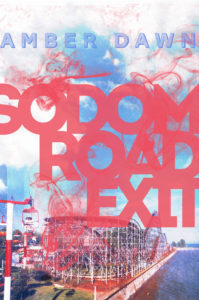 I’ve had Amber Dawn’s Sodom Road Exit waiting for me since the beginning of May, when I bought it right after seeing her speak on a panel on genre at the Festival of Literary Diversity. She was fantastic on the panel (along with Cherie Dimaline, David A. Robertson, and Michelle Wan), explaining that Sodom Road is an actual road with an exit off the QEW to get to her hometown of Crystal Beach, on Lake Erie, which was once a thriving resort town with an amusement park famous for its terrifying roller coaster. Her novel is set during the summer of 1990, a year after the amusement park closed and things are officially in decline. Which is when Starla Mia Martin returns to town, driven by debt and desperation to move back in with her mother, and then inadvertently begins to channel a ghost who is powered by relics from the old amusement park, the spirit of a woman who’d been killed in an accident on the roller coaster decades before. But is this a benevolent spirt? Is she helping Starla get back on her feet, or is she only making it worse—and for a good portion of the book, it’s hard to tell. Starla gets a job working at a campground on the graveyard shift, which doesn’t help calm her mind at all, or reduce her propensity for being haunted. And as her connection to the spirit intensifies, Starla’s situation is complicated by the relationships she’s developing in Crystal Beach, in spite of herself—with her boss at the campground, an Indigenous woman who lives there and is struggling to maintain custody of her son, with the former high school classmate who dances at the local bar and with whom Starla might possibly think about entering into a relationship…were she the type of person who did such a thing as have loving relationships, and also if she wasn’t already cavorting with a woman who’s been dead for fifty years.
I’ve had Amber Dawn’s Sodom Road Exit waiting for me since the beginning of May, when I bought it right after seeing her speak on a panel on genre at the Festival of Literary Diversity. She was fantastic on the panel (along with Cherie Dimaline, David A. Robertson, and Michelle Wan), explaining that Sodom Road is an actual road with an exit off the QEW to get to her hometown of Crystal Beach, on Lake Erie, which was once a thriving resort town with an amusement park famous for its terrifying roller coaster. Her novel is set during the summer of 1990, a year after the amusement park closed and things are officially in decline. Which is when Starla Mia Martin returns to town, driven by debt and desperation to move back in with her mother, and then inadvertently begins to channel a ghost who is powered by relics from the old amusement park, the spirit of a woman who’d been killed in an accident on the roller coaster decades before. But is this a benevolent spirt? Is she helping Starla get back on her feet, or is she only making it worse—and for a good portion of the book, it’s hard to tell. Starla gets a job working at a campground on the graveyard shift, which doesn’t help calm her mind at all, or reduce her propensity for being haunted. And as her connection to the spirit intensifies, Starla’s situation is complicated by the relationships she’s developing in Crystal Beach, in spite of herself—with her boss at the campground, an Indigenous woman who lives there and is struggling to maintain custody of her son, with the former high school classmate who dances at the local bar and with whom Starla might possibly think about entering into a relationship…were she the type of person who did such a thing as have loving relationships, and also if she wasn’t already cavorting with a woman who’s been dead for fifty years.
Things get complicated Or even more complicated? Starla, following the instructions of the spirit, has a memorial gazebo erected out of materials from the amusement park, and people begin to travel from miles around to witness her communing with the dead and perhaps channelling their own lost loved ones. But the toll of these experiences and the burden of Starla’s connection to the spirit become too much for her to carry and her mental and physical health begin to suffer, so much so that soon the people who love her are frightened for her life.
I picked up this book because I was intrigued by the setting, and also so fascinated by Dawn’s remarks on genre and the idea of the novel as a container for a ghost story. And I was a little bit intimidated to finally start reading it because a) it had the word “sodom” in the title, b) it was a solid brick of a book and was I ready to commit to that many pages, and c) in order for the premise to work, it would have to be a really, really exceptional novel. Which, it turns out, it is. I loved this novel. We were camping the weekend before last, which isn’t always the best place to be reading, because there are bugs, and chores, and children setting themselves on fire, but all these things took a back seat as I read 300 pages of this book in two days, and came home and read the rest once the laundry was done, because it really was that compelling, so masterfully crafted. It’s a perfect gripping amazing summer read, but it’s also underlined with substance—the stakes are real here. I absolutely loved it.
August 3, 2018
Five Stars
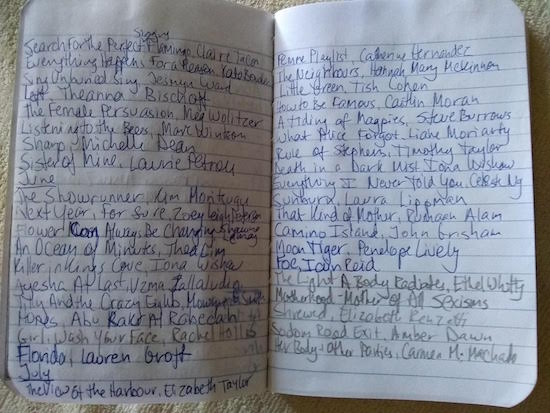
I finished reading a novel last night, and thought what a wonderful thing it was to have no need at all to consider out of five how many stars this book deserved. What a relief it was just to read, and not to rate, or even go online at all (and it is certainly also a bonus also not to stumble across reviews of my own book that begin with, “Wow, this was a painful read. How boring was this, am I right?” (Not that I’ve ever sought out Goodreads reviews of my book. I am far too cool and assured for that, as you no doubt realize.) Instead, I just open up my Book of Books which lives on my bedside, inspired by Vicki Ziegler and Pamela Paul. And another book is entered, with whatever writing device I happen to have on hand. (I really need to go shopping for pens.) Last month, I read twenty books, which I think might be an all-time record for me. It’s been a glorious summer for reading so far, and there is still so much of August left, and I’ve been able to even reread, and make a little dint in the pile of books on the stairs, though you might not know that to see it. You see my Book of Books though, and you’ll realize I’ve been going places, bookwise. Halfway through the first year tracking books with this method, I just want to check in and say it’s wonderful, analogue, good for the soul. Five stars all the way.
